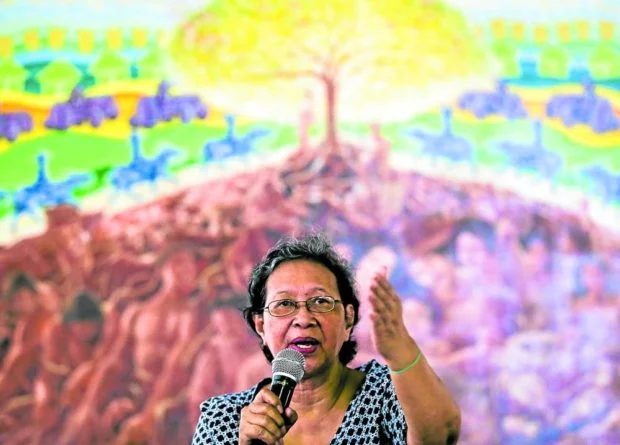
By: Frances Mangosing – Reporter /Philippine Daily Inquirer /April 26, 2022
MANILA, Philippines — Amaryllis Hilao-Enriquez, a survivor of the Marcos dictatorship who endured torture and detention and thereafter became a leading human rights advocate, died in Covina, California, on Sunday. She was 68.
Her daughter Marie Andrea said on Facebook, “My mother dedicated her life to fighting for justice and human rights. She was a beautiful person, funny, intelligent, brave, and strong. She was loved and will be greatly missed.”
Hilao-Enriquez, whom many fondly called Marie, succumbed to complications from Parkinson’s disease.
Human rights group Karapatan, in a tribute to its founder and longtime chair, remembered her as “a stalwart in the anti-Marcos dictatorship struggle and in the relentless advocacy for justice and accountability of the Marcoses.”
Hilao-Enriquez had also mentored several activists and human rights workers, according to the group.
“We are deeply indebted to her brilliant, selfless and passionate work as among the foremost human rights defenders in the Philippines. We vow to strive to honor her legacy of service to the Filipino people in every possible way that we can and as long as tyrants and dictators remain in our midst,” Karapatan said.
Arrest, torture
Hilao-Enriquez was a scholar taking up occupational therapy at the College of Medicine of the University of the Philippines (UP) in Manila when she became involved in activism, joining a chapter of the militant youth organization Kabataang Makabayan. She was 20 at that time.
Her older sister, Liliosa, was already a journalist even while studying at the Pamantasan ng Lungsod ng Maynila.
On April 4, 1973, almost a year after Marcos’ declaration of martial law, soldiers of the Philippine Constabulary (PC) who were in civilian attire barged into the Hilao residence in Quezon City.
When Liliosa demanded that they show an arrest warrant, the soldiers took her away and brought her to Camp Crame, the headquarters of the PC (now the Philippine National Police).
Two days later, Liliosa was found dead, the first political prisoner to die under torture during martial law. She is among those listed at the Bantayog ng mga Bayani memorial.
Following that episode, Hilao-Enriquez went underground, working as a community organizer. She was captured in 1974, together with her husband, brother, and sister-in-law, and was herself tortured. While in detention for the next two years, she gave birth to her first child, Liza Liliosa, named after her fallen sister.
After she was freed, she took part in Kapisanan para sa Pagpapalaya at Amnestiya ng mga Detenidong Pulitikal sa Pilipinas in an effort to campaign for her husband’s release.
‘Icon’
Later on, she worked for Task Force Detainees and became chair of Samahan ng Ex-Detainees Laban sa Detensyon at Aresto, which was formed in 1985 but became active the next year, after the fall of the Marcos dictatorship.
The Hilao family initiated the class suit in Hawaii against the ousted dictator Ferdinand Marcos who was exiled there.
Hilao-Enriquez was also a convener of the Campaign Against the Return of the Marcoses and Martial Law.
In a statement on her passing, Edre Olalia, president of the National Union of Peoples’ Lawyers, said: “Tita Marie was very dear to me. We walked together in many a journey to defend, protect [and] promote human rights.”
“From Manila to Geneva, from Utrecht to Oslo to New York, she was a partner, aunt, comrade, and friend,” he added.
Olalia also described Hilao-Enriquez as “unique, indefatigable, funny, thoughtful and selfless, even as she was naughty and sometimes pesky in her own adorable way.”
“To say that she is an icon of the human rights struggle is an understatement,” he said.